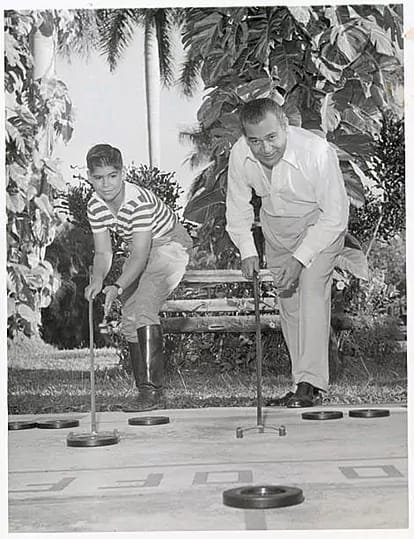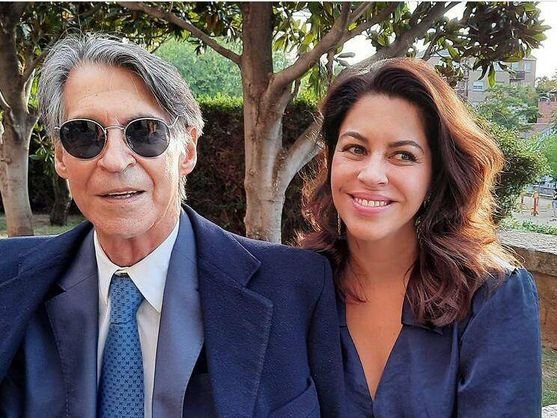BOBBY BATISTA
Autor: Juan Carlos Reyes Díaz
Poco antes de morir Bobby Batista, hijo de Fulgencio Batista y Marta Fernández escribió "Hijo de Batista" un texto donde narraba gran parte de su vida en el exilio. Bobby Batista había nacido en Manhattan después que los Batistas se asentaron en esa ciudad norteña.
El vástago del general tenia tan solo 9 años cuando su padre fue derrocado, saliendo de Cuba rumbo a los Estados Unidos el 30 de diciembre en compañía de su hermano mayor. Fulgencio Batista tenía prohibido en caso de caer su gobierno viajar a Los Estados Unidos, por lo que decidió pedir asilo al dictador Rafael L. Trujillo en República Dominicana, lo que sería uno de sus grandes desaciertos.
El resto de los hijos de Batista con su primera esposa Elisa si pudieron viajar a la casa que tenía el general oriental en Daytona Beach.
En el libro Bobby describe los difíciles años en el exilio que llevaron a su familia, primero a Portugal y después a España bajo la protección del dictador gallego Francisco Franco.
En el texto también analiza con sinceridad el segundo mandato presidencial de su padre, el cuál consideró con transparencia como anticonstitucional. Para los miembros del grupo interesados en estudiar sobre esta temática el texto se encuentra disponible en los archivos del grupo.
Cuba, historias no contadas
142/2024
Dios, Patria y Libertad
BOBBY BATISTA
Author: Juan Carlos Reyes Díaz
Shortly before Bobby Batista, son of Fulgencio Batista and Marta Fernández, died, he wrote "Hijo de Batista", a text in which he narrated a large part of his life in exile. Bobby Batista was born in Manhattan after the Batistas settled in that northern city.
The general's son was only 9 years old when his father was overthrown, leaving Cuba for the United States on December 30 in the company of his older brother. Fulgencio Batista was prohibited from traveling to the United States if his government fell, so he decided to ask the dictator Rafael L. Trujillo for asylum in the Dominican Republic, which would be one of his greatest mistakes.
The rest of Batista's children with his first wife Elisa were able to travel to the house that the eastern general had in Daytona Beach.
In the book Bobby describes the difficult years in exile that took his family, first to Portugal and then to Spain under the protection of the Galician dictator Francisco Franco.
In the text he also sincerely analyzes his father's second presidential term, which he transparently considered unconstitutional. For group members interested in studying this topic, the text is available in the group's archives.
Cuba, untold stories
142/2024
God, Country and Freedom


Bobby Batista se ha ido sin poder cumplir uno de sus sueños, el que iba a realizar esta primavera llevando debajo del brazo su libro, ‘Hijo de Batista’, por los rincones de Marbella, la tierra que vio morir a su padre, presidente de Cuba en el exilio, Fulgencio Batista que llegó al poder por primera vez en 1940 como presidente constitucional y de nuevo en 1952 tras un golpe de estado. El hijo del mandatario moría ayer en Madrid aquejado de un cáncer, después de haber estado luchando estos meses con todas sus fuerzas contra la enfermedad. Se fue rápido y sin volver a tocar ese terruño cubano que abandonó junto a su familia, cuando fueron destronados por el régimen comunista de Fidel Castro. Hace solo unos días, Vanitatis conversaba con este hombre, abogado y escritor, que acababa de publicar su libro, ‘Hijo de Batista’, una obra que quedará anclada en los anales de la historia como el fiel reflejo de su particular vivencia en aquella isla. Esta es la primera vez que un miembro de la familia Batista ha contado sus memorias personales. Su padre moría como consecuencia de un ataque al corazón el 6 de agosto de 1973, en su chalet de Guadalmina en Marbella, donde solía pasar sus vacaciones de verano. Al día siguiente, acompañado por su familia, sus restos fueron trasladados al cementerio de San Isidro de Madrid. Y testigo de aquellos acontecimientos fue Roberto: “Ahora estoy encantado de volver a pisar la tierra que tanto nos gustaba de niños y que vio morir a mi padre, y desde donde partió su féretro con la bandera cubana. Presentar mi libro allí y explicarle a la gente quién era mi padre, me da fuerzas para superar esta enfermedad, que ahora me tiene enredado en sesiones de quimioterapia. Sigo en tratamiento con mucha fe y oraciones”.
Hace solo unos meses asistió a la Feria del libro de Madrid. Su hija, Esther Batista, que ha sido un gran apoyo en su enfermedad, decía entonces: “Lo hemos conseguido a pesar de las dificultades. Papá ha hecho un gran esfuerzo, es un valiente. Un millón de gracias a todos los que os habéis acercado a verle”.
Sus días en el Palacio Presidencial
Bobby nació en Nueva York, se educó en colegios suizos, trabajó como abogado y escritor, y nunca quiso alejarse de su propia historia. Orgulloso de ella, quiso dejarla plasmada en papel, y así se decidió a escribir sus memorias. En la parte más personal de ‘Hijo de Batista’, Bobby narra su infancia privilegiada. Recuerda sus días maravillosos en el Palacio Presidencial, pero en su relato enseguida da paso al tema del exilio: “Mi hermano y yo éramos ajenos a la situación política que nos había hecho abandonar Cuba y, cuando llegamos por la noche al aeropuerto de Nueva York, vimos a una muchedumbre que nos gritaba tras una cerca. Pero es que gritaban vejaciones, impertinencias, malas palabras. Y, claro, estábamos francamente impresionados”. En la ruta del exilio de su padre, cuenta que la familia se dividió. Batista puso rumbo a la República Dominicana, que, en aquel momento, vivía bajo la dictadura de Rafael Leónidas Trujillo. “Nunca comprendí por qué mi padre se fue a la República Dominicana. Trujillo pretendió que mi padre fuese con él a invadir Cuba, y al parecer, mi padre se negó rotundamente. Como consecuencia, lo metió en la cárcel, y después lo amenazó, continuamente, con matarlo”. Finalmente, cuando terminaron con aquella odisea, reunida de nuevo su familia, se fueron a vivir a Portugal, en plena dictadura de Salazar. Allí, Fulgencio Batista se dedicó, sobre todo, a escribir libros. Uno de ellos, quizás el más importante para comprender la política cubana, es el de la ‘Respuesta”.
Bobby Batista has left without being able to fulfill one of his dreams, the one he was going to realize this spring carrying his book, 'Hijo de Batista', under his arm, through the corners of Marbella, the land that saw his father, president of Cuba in exile, Fulgencio Batista who came to power for the first time in 1940 as constitutional president and again in 1952 after a coup d'état. The president's son died yesterday in Madrid suffering from cancer, after having been fighting with all his might against the disease these months. He left quickly and without ever touching again that Cuban land that he abandoned with his family, when they were dethroned by the communist regime of Fidel Castro. Just a few days ago, Vanitatis was talking with this man, lawyer and writer, who had just published his book, 'Son of Batista', a work that will remain anchored in the annals of history as a faithful reflection of his particular experience on that island. . This is the first time that a member of the Batista family has told their personal memories. His father died as a result of a heart attack on August 6, 1973, in his villa in Guadalmina in Marbella, where he used to spend his summer holidays. The next day, accompanied by his family, his remains were transferred to the San Isidro cemetery in Madrid. And Roberto was a witness to those events: “Now I am delighted to return to the land that we loved so much as children and that saw my father die, and from where his coffin left with the Cuban flag. Presenting my book there and explaining to people who my father was gives me strength to overcome this illness, which now has me entangled in chemotherapy sessions. “I continue in treatment with a lot of faith and prayers.”
Just a few months ago he attended the Madrid Book Fair. His daughter, Esther Batista, who has been a great support during his illness, said then: “We have achieved it despite the difficulties. Dad has made a great effort, he is brave. A million thanks to all of you who have come to see him.”
His days in the Presidential Palace.
Bobby was born in New York, educated in Swiss schools, worked as a lawyer and writer, and never wanted to distance himself from his own story. Proud of her, he wanted to leave her on paper, and so he decided to write his memoirs. In the most personal part of 'Son of Batista', Bobby narrates his privileged childhood. He remembers his wonderful days in the Presidential Palace, but in his story he immediately gives way to the topic of exile: “My brother and I were oblivious to the political situation that had made us leave Cuba and, when we arrived at the New York airport at night , we saw a crowd shouting at us behind a fence. But they were shouting humiliations, impertinences, bad words. And, of course, we were frankly impressed.” On his father's route of exile, he says that the family was divided. Batista headed to the Dominican Republic, which, at that time, was living under the dictatorship of Rafael Leónidas Trujillo. “I never understood why my father went to the Dominican Republic. Trujillo wanted my father to go with him to invade Cuba, and apparently, my father flatly refused. As a result, he put him in jail, and then continually threatened to kill him.” Finally, when they finished that odyssey, their family was reunited again, and they went to live in Portugal, in the middle of the Salazar dictatorship. There, Fulgencio Batista dedicated himself, above all, to writing books. One of them, perhaps the most important to understand Cuban politics, is the 'Response'.
¡Lluvia de bendiciones para todos! | ¡Blessings showered on all!
Algún día seremos pueblo libre cuba - Vzla, un solo país una sola bandera. Son grandes países esta historia no la conocía gracia por compartirla de parte de @theshot2414……
Gracias bro...ojalá todos se unan y podamos romper estas cadenas...nos an quitado todo